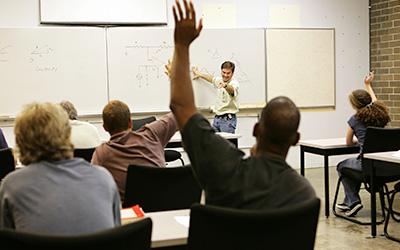



Maybe you started school years ago but never finished. Or perhaps the corporate world, domestic life, or the military dominated your youth. Perhaps it’s time for a career switch, or you may just want to learn something new. Whatever your motivations, returning to school alongside the typical college-goer may seem daunting.
But as the old adage says, “Experience is the mother of wisdom.” As a more experienced student, you and your peers can benefit now from the wisdom you gained in the past.
In a recent Student Health 101 survey, more than 65 percent of respondents said they’d had some form of experience outside of their academics. Whether through part- or full-time work, volunteering, raising children, or military service, the skills you’ve developed-like time management, organization, and discipline-are helpful in college.
Alicia P., a first-year graduate student at Bethel University in McKenzie, Tennessee, notes the utility of things learned on the job. “My analytical and research skills, as well as the ability to make connections between subjects, all come in handy,” she says.
Even technical skills perfected in the “real world,” like report writing and sticking to deadlines, are helpful in school.
Your experiences may also help you understand and apply your coursework. “I always try to incorporate what I’ve learned into a situation I relate to,” says first-year graduate student Ruth L. at Humber College in Ontario, Canada. “It then becomes personalized, making me more likely to remember.”
As Chinese Confucian philosopher Xunzi said, “Tell me and I’ll forget. Show me and I may remember. Involve me and I’ll understand.”

Discussion has become an important component of many courses. Class conversations help students:
Thanks to your background, you may have a great deal to contribute, which can benefit you and your classmates.
For example, you may be able to offer insight based on real-world experiences that make abstract ideas concrete. Your background may also have strengthened your ability to consider concepts with a critical eye.
Jacqueline H., a second-year graduate student at Life University in Marietta, Georgia, says, “I bring up experiences that contribute to the discussion. If talking about pediatric nutrition, I may elaborate on experiences with my own children.”
Also, everyone benefits from diversity, and that includes people of varied ages and experiences.
For example, you may be able to connect other students to career opportunities through your network, and they may introduce you to new areas of study or innovative technology.
Dr. Rob Jenkins, a professor of English at Georgia Perimeter College in Decatur, says he enjoys mixing groups of traditional and nontraditional students.
“I find that the older ones tend to be quicker than their younger counterparts to identify problems with logic and detail, while students fresh out of high school can often help older classmates with arcane grammar rules and modern submission guidelines,” he explains. “It’s a classic ‘win�win’ situation: Everyone learns and everyone benefits.”

You may be able to get course credit for prior experience. More than 20 percent of the respondents to the recent Student Health 101 survey said they did.
Even if you’re not staying in the same field, you can still apply what you’ve learned in the past.
Husang L., a student at University of Florida in Gainesville, notes, “Life and work experiences help you in graduate program applications. Schools are looking for well-rounded people that bring perspective to the table.”
Dr. Chris Blankenship, assistant professor of English at Emporia State University in Kansas, says experienced students are better able to translate what they’re learning into their long-term plans.
Laura H., a sophomore at Fleming College in Ontario, Canada, says her experience will give her a leg up. “My customer service skills will be a huge advantage for me.”
Dr. Blankenship agrees. “[Experienced students] had a taste of how school can be applied in useful, everyday ways, so I believe they’re better at transferring the course material to different contexts.”
Your wisdom will never be wasted. You may even be able to teach your professors a thing or two!
Sandra is a freelance writer and editor, studying journalism and biology at Georgia State University.




